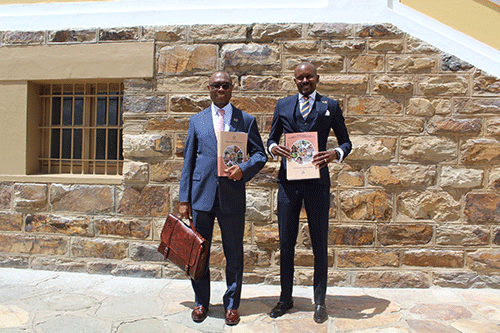Preliminary outturns in many respects point to improving fiscal fundamentals aligned to positive domestic economic growth prospects and buoyancy arising from tax administration reforms, Finance and Public Enterprises Minister Iipumbu Shiimi has said.
Tabling his 2023/24 national budget last week in the National Assembly, he noted that by the end of January 2023, preliminary revenue outturn stood at N$56.2 billion, reflecting a collection rate of 87.8% over 10 months.
“Strong growth has been noted on some domestic revenue streams, in particular Value-Added Tax (VAT), which recorded a 103% collection rate over the period, as well as income tax on individuals,” he stated.
Against this backdrop, and with two months remaining in the financial year, total revenue for FY2022/23 is revised marginally upwards by N$97 million.
Total collections of N$74.7 billion are estimated for FY2023/24. The significant boost to revenues stems from an upward revision in receipts from the Southern African Customs Union (SACU) pool to N$24.3 billion.
Efforts behind such a collection rate is from the Namibia Revenue Agency (NamRA), which is the nation’s tax-collecting authority.
On the domestic front, recovery in economic activities, supported by gains from improved tax compliance in line with tax administration reforms, resulted in upward revisions of expected collections on value-added tax (VAT) and personal income tax, added Shiimi.
He noted that better revenue forecasts
provide government with more room to make the necessary allocations to address the most pressing needs facing the country.
In consideration of this, the minister tabled the FY2023/24 budget amounting to N$84.6 billion, which represents an increase of 9.7% from comparable levels for last year.
He observed that increasing the tax burden at this juncture stands the risk of stifling economic recovery, and compromising the emerging
growth prospects. In the near term, government will thus focus its efforts on tax administration reforms to ensure revenue enhancement through adequate tax compliance.
Furthermore, over the first six months of the Modified Electronic Filing Tax Relief Programm,e which was rolled out by NamRA, a total of N$747 million was collected from the recovery of outstanding tax arrears. This is an addition to the N$1.3 billion collected from the initial Electronic Filing Tax Relief Programme which ended on 31 January 2022.
The programme was meant to provide relief to taxpayers with outstanding tax debts. To benefit, taxpayers were urged to register on the Integrated Tax Administration System (ITAS) portal, and file their tax returns electronically.
Tax relief
During the medium-term expenditure framework (MTEF) under review, focus will be placed on the implementation of measures to provide some relief to taxpayers in the near to medium-term.
Shiimi said the non-mining company tax rate will be reduced by two percentage points over the two outer years of the MTEF. The tax rate will be reduced to 31% effective on 01 April 2024, with a further reduction to 30% on 01 April 2025.
In efforts to provide tax relief to low-income- earners, government has resolved to introduce tax relief for individuals in the N$50 000 to N$100 000 tax bracket, effectively reducing their tax rate to zero, effective in FY2024/25.
“NamRA will continue with the final instalment of the tax arrears’ relief programme, whereby interest and penalties will be fully written off if outstanding capital is fully-settled by 30 October 2024. This is the final extension of this programme, and we urge all concerned taxpayers to participate before the due date. Afterwards, there will be no more mercy,” warned Shiimi.
According to the estimate report from the finance ministry, the revenue agency is expected to get an increase in its yearly subsidy from N$400 million to N$900 million.


